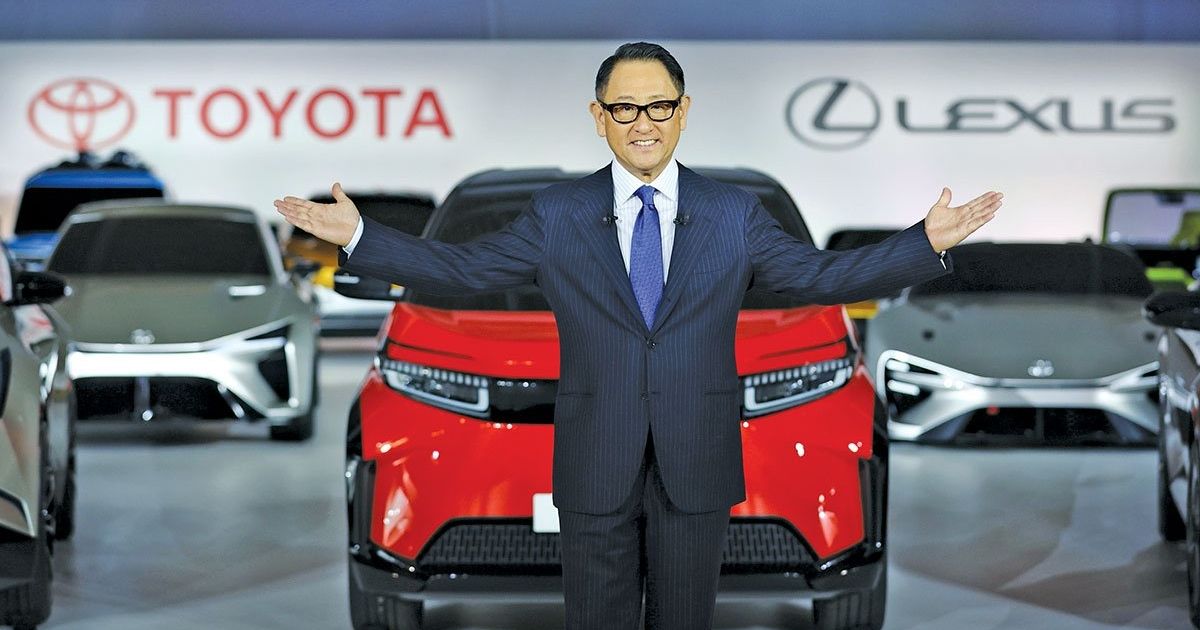
Toyota Motor Corp. is working to foster candidates capable of eventually taking the top job, President Akio Toyoda told shareholders at an annual meeting.
The world’s No. 1 automaker is taking steps to find and develop potential successors, Toyoda, 66, said in response to a shareholder’s question at corporate headquarters Wednesday.
Anyone following in his footsteps must have “unshakable conviction on why Toyota exists” and a firm understanding of the company’s philosophy, Toyoda said, adding that his goal will be to “rejuvenate” management with the move.
Toyoda has sought to reform Toyota’s corporate culture, spending more time with younger executives, and cutting back some senior positions.
The brief question-and-answer moment shines light on a topic that’s been top of mind for some Toyota investors and analysts over the past few years: Who is in line to replace the automaker’s current president who, over the past 13 years, has captained its rise to record profit and pole position as Japan’s most valuable company.
Toyoda, grandson of the founder, is the second-longest tenured head of a major automotive company, according to data compiled by Bloomberg. He took the reins at Toyota in 2009, shortly after Elon Musk assumed his post at Tesla.
Steps in March to create a new “executive vice president” role has fueled mild speculation on the company’s succession plans, and whether the three men selected for the position — CFO Kenta Kon, Chief Technology Officer Masahiko Maeda and Chief Human Resources Officer Masanori Kuwata — are being groomed as candidates for the top job.
In 2020, Toyoda appointed company veterans Maeda and Kenta Kon to top roles. Both were 51 at the time — a relatively young age for top Toyota executives.
Koji Kobayashi, an operating officer who spoke at Wednesday’s shareholders meeting, declined to say who may be in the succession pipeline. Instead, he took a few minutes to reflect on Toyoda’s tenure, saying that the top executive helmed the company through “crises, one after another.”
While others may have been overwhelmed, Toyoda was “energized,” he said. Now, he’s starting to “plant seeds for the future, with three young executive vice presidents and other executives,” Kobayashi added.
In terms of age, Toyoda is still on the younger side, compared with when prior Toyota presidents stepped aside. Katsuaki Watanabe was 67 when he relinquished the role in 2009, while Fujio Cho was 68.
“I would wish to pass on the baton to a successor as soon as it makes sense,” Toyoda said in an interview published in an in-house publication in 2020. That decision will take some time to think over, Toyoda said. With regard to a successor, “they have to exceed me. It’s a tough challenge, but it’s what’s best for our stakeholders.”
What’s clear is any successor will take on an enormous job: leading the 84-year-old company through the global auto industry’s swift and sometimes turbulent shift to autonomous, electric vehicles.
When Toyoda took over as president, the automaker was just on the edge of a recall that would impact millions of vehicles.
The company posted a record loss of 392 billion yen ($2.9 billion). In the years since, Toyota’s profits steadily recovered and then ballooned. That was despite periods of intense disruption ranging from an earthquake and tsunami that upended Japan’s automobile production in 2011, to the COVID-19 pandemic.
Since Toyoda took over in June 2009, Toyota shares have almost tripled, giving the company a valuation of almost 34 trillion yen.
Even through the most recent period of disruption, Toyota kept its supply chains relatively steady, beating Volkswagen Group in 2020 and 2021 to claim the title of the world’s top-selling automaker.
Analysts, on average, are projecting that Toyota will post a record operating profit of 3.24 trillion yen for the fiscal year through March, up more than 40 percent from before the Toyoda era.
Toyoda also led the company’s forays into new arenas, forging partnerships with Panasonic Holdings and Softbank Group in batteries and self-driving cars. He also pushed Toyota’s investment in Tesla and committed 8 trillion yen worth of spending on its fleet of EVs.
Toyoda’s son, Daisuke Toyoda, 34, is often flagged as next in line after his father’s immediate successor. He’s currently a senior vice president at Woven Planet Holdings, Toyota’s advanced technology arm led by roboticist James Kuffner.
Though the wish is for Toyoda to stay on forever, “there’s a limit,” Kobayashi said. The president has been working on building a management structure, “and whoever becomes the next president, I’m sure the company will be in good shape,” he said.
Toyoda has also presided over the automaker’s move to a battery-electric vehicle lineup, a shift that some have criticized as being too slow.
In December, Toyoda announced the automaker was committing 8 trillion yen ($70 billion) to electrifying its range by 2030, half of it to develop a battery-electric vehicle lineup, as it looks to tap a growing market for zero-emission cars.
But the automaker, which is a relative latecomer to full-electric cars, said it expected annual sales of battery-only cars to reach just 3.5 million vehicles by the end of the decade as the company still pursues a multi-pronged, carbon-reduction strategy that also includes hybrids and hydrogen-powered vehicles.
“I would pick someone who understands the company’s philosophy as my successor,” he said at Wednesday’s meeting.
Toyota, which sold 10.5 million vehicles in 2021, far outstripping closest rival Volkswagen Group, has repeatedly cut production this year, plagued by a global chip crunch.
Bloomberg and Reuters contributed to this report